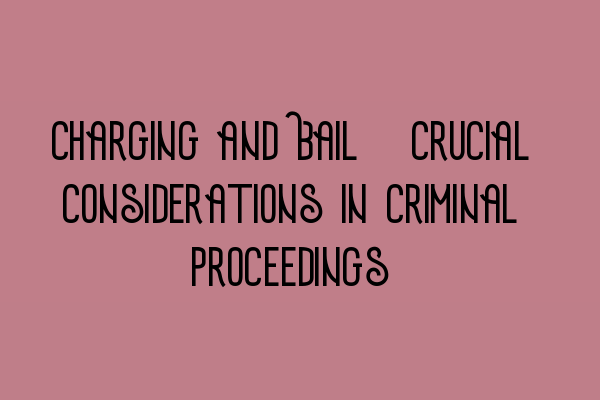Charging and Bail: Crucial Considerations in Criminal Proceedings
Welcome to SQE Criminal Law & Practice Law UK! In this blog post, we will delve into the crucial considerations surrounding charging and bail in criminal proceedings in the UK. Understanding the process and the key factors that come into play is essential for legal professionals and aspiring solicitors.
What is Charging?
In criminal law, charging refers to the formal accusation of an individual for committing a criminal offense. The process of charging involves gathering evidence, assessing its strength, and determining whether there is a sufficient basis to proceed with the case. Prosecutors play a vital role in this process, as they review the evidence provided by the police and make a decision on whether to charge the suspect or not.
It is important to note that a charging decision should be based on the Code for Crown Prosecutors, which outlines the evidential and public interest factors prosecutors need to consider. Familiarizing yourself with this code is crucial to make informed charging decisions and uphold the principles of fairness and justice.
Key Considerations in Charging
When determining whether to charge an individual, prosecutors must carefully examine the available evidence and consider various factors. These include:
- The strength of evidence: The evidence collected should be strong enough to provide a realistic prospect of conviction.
- The seriousness of the offense: Prosecutors need to assess the gravity of the offense and consider whether the public interest requires a prosecution.
- The public interest: Prosecutors should weigh the public interest in pursuing a case against the potential harm caused by prosecution.
Understanding these key considerations is crucial in order to make informed charging decisions that are fair, just and maintain public trust in the criminal justice system.
The Role of Bail
Once an individual has been charged, the next consideration is whether to grant bail or remand them in custody. Bail is the temporary release of an accused person who is awaiting trial or sentencing, under specified conditions and guarantees. The primary purpose of bail is to strike a balance between the rights of the accused and the interests of justice.
Decisions about bail are made by the court, taking into account various factors such as:
- The seriousness of the offense: More serious offenses may increase the likelihood of remand.
- The risk of fleeing: The court needs to assess the risk of the accused person absconding before trial.
- The risk of re-offending: Consideration should be given to the likelihood of the accused person committing further offenses if released on bail.
- The risk of interfering with witnesses or evidence: The court needs to consider whether the accused person poses a risk to witnesses or may tamper with evidence.
Understanding the factors that influence bail decisions is crucial for legal professionals to advocate effectively for their clients and ensure a fair and just process.
Conclusion
Charging and bail are crucial considerations in criminal proceedings that require careful assessment of evidence, public interest, and other factors. By understanding the charging process and the key considerations in granting bail, legal professionals can navigate the criminal justice system with confidence and uphold the principles of fairness and justice.
If you are interested in further expanding your expertise in criminal practice, we recommend checking out our related articles:
- Workshops and Seminars on Criminal Practice: Expanding Your Expertise
- Updates in UK Criminal Laws: Staying Informed and Prepared
- Mock Tests for SQE Criminal Practice: Exam Simulation for Success
- Enhancing Your SQE Criminal Law Study Group Experience
- Decoding Criminal Evidence Rules: A Detailed Analysis
